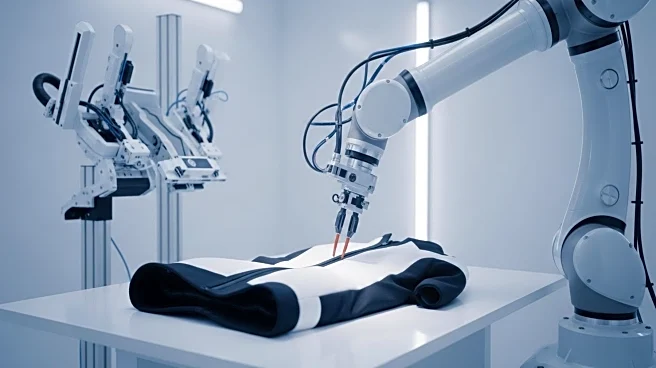What's Happening?
CreateMe, a company specializing in apparel manufacturing technology, has introduced a new system called MeRA (Modular-engineering Robotic Assembly) and Pixel, designed to transform the garment industry. This scalable, modular architecture aims to enhance apparel manufacturing by making it more customized, precise, and consumer-focused. The technology supports local, sustainable, and on-demand production, reducing lead times by up to 70% and achieving cost parity with offshore labor. CreateMe's innovations are set to debut in women's intimates, marking the industry's first fully autonomous bonded intimates product, which promises improved fit, comfort, and sustainability.
Why It's Important?
CreateMe's advancements in robotic assembly and adhesion technology represent a significant shift in the garment industry, potentially setting new standards for apparel production. By enabling local and small-batch manufacturing, the company addresses key industry challenges such as overproduction, textile waste, and CO2 emissions. This approach aligns with growing consumer demand for sustainable and ethically produced clothing. The ability to produce garments quickly and efficiently could disrupt traditional manufacturing models, offering brands a competitive edge in a rapidly changing market.
What's Next?
CreateMe plans to expand its technology to everyday apparel, including T-shirts, further revolutionizing the garment industry. As the company continues to innovate, other industry players may adopt similar technologies to remain competitive. The focus on sustainability and local production could lead to broader industry changes, with more companies prioritizing eco-friendly practices. The success of CreateMe's bonded apparel may inspire new product lines and collaborations, potentially reshaping consumer expectations and industry standards.
Beyond the Headlines
The shift towards robotic assembly and adhesion technology raises questions about the future of labor in the garment industry, as automation may reduce the need for traditional manufacturing jobs. Ethical considerations regarding the impact on workers and communities reliant on garment production must be addressed. Additionally, the emphasis on sustainability may prompt discussions on the environmental impact of different manufacturing processes, influencing industry regulations and consumer choices.










